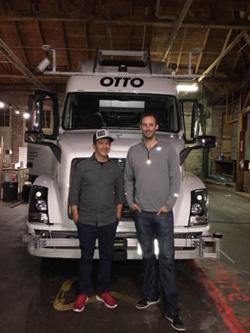 Uber has reportedly paid $680 million to acquire Otto, a 90-plus person technology startup whose mission is to rethink transportation, starting with self-driving
trucks. The move widens its lead on autonomous transportation with tech leaders such as Google and Tesla Motors.
Uber has reportedly paid $680 million to acquire Otto, a 90-plus person technology startup whose mission is to rethink transportation, starting with self-driving
trucks. The move widens its lead on autonomous transportation with tech leaders such as Google and Tesla Motors.
Anthony Levandowski, Otto’s co-founder, will now lead the
combined self-driving efforts at Uber, reporting directly to Travis Kalanick, CEO and Uber co-founder.
"When it comes to this advanced technology stack, Otto plus Uber is a dream
team," Kalanick wrote in a post.
Kalanick called Levandowski one of the world's "leading autonomous engineers," noting that
his first invention, a self-driving motorcycle called Ghostrider, is now in the Smithsonian.
advertisement
advertisement
Levandowski, Otto’s co-founder, worked between April 2007 and January 2016 as a software
engineer at Google. He left Google, along with others, earlier this year to work on self-driving trucks.
Otto began turning commercial trucks into self-driving vehicles with the help of
retrofitted kits, and initially began testing the technology with Volvo on the VNL 780, according to one report.
Self-driving trucks with Volvo are not the only autonomous vehicles Uber is working on. Later
in August, Uber will allow customers in downtown Pittsburgh to summon a self-driving car — about 100 modified Volvo XC90 sport-utility vehicles — from their phones, an achievement that
Google and Tesla Motors, among others, have yet to reach.
Uber and Volvo forged an agreement earlier this year to spend $300 million to develop a fully autonomous car that will be ready for
the road by 2021. The Volvo XC90 sport-utility vehicles have dozens of sensors that use cameras, lasers, radar, and GPS receivers.
The company has been on a quest to change the car services
industry for years. Uber also acquired assets from Microsoft Bing
back in June 2015, including 100 employees focused on the product image collection, as well as intellectual property licenses, software, and physical goods such as cameras.
Uber's Otto
acquisition, bringing on Levandowski, acquiring the mapping assets from Microsoft Bing, and the partnerships with Volvo are extremely critical to the company's future.
The steps announced
Thursday are crucial to the company's self-driving strategy because Uber has no experience making cars, according to Kalanick. "By combining Uber’s self-driving technology with Volvo’s
state-of-the art vehicles and safety technology, we’ll get to the future faster than going it alone," he said.